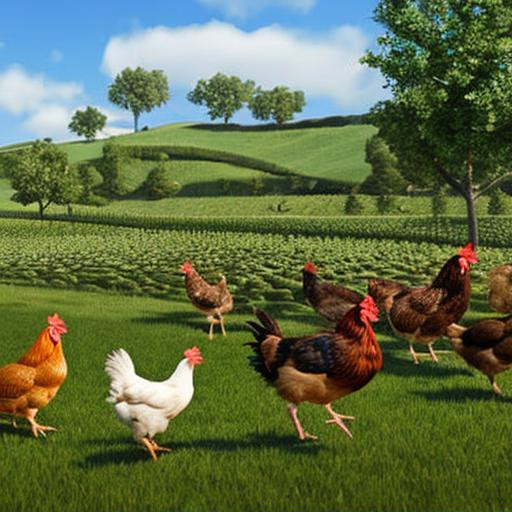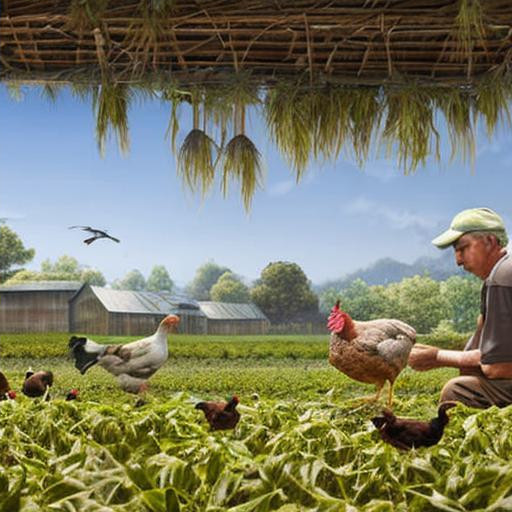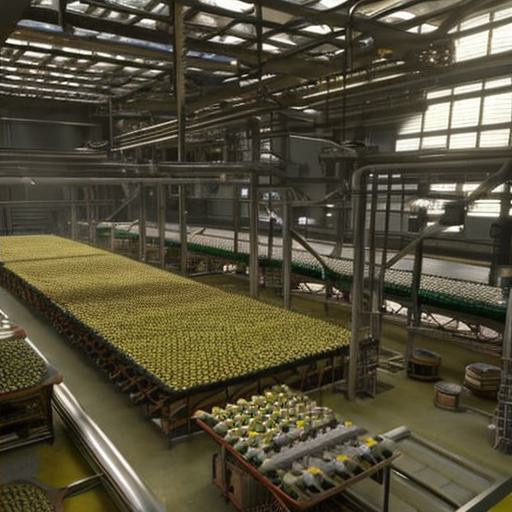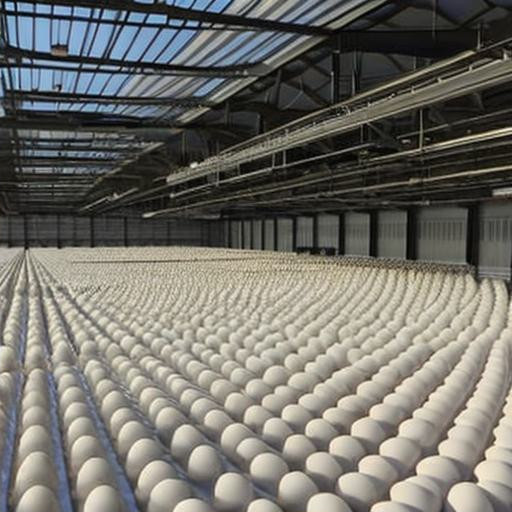

Chicken egg production is the process of producing eggs from chickens, which are commonly used as a source of food for humans. This process involves the care and management of a flock of chickens, including providing them with proper nutrition, housing, and healthcare. The hens lay eggs, which are then collected and processed for sale or consumption.
Chicken egg production is a major agricultural industry in the United States. The country is one of the largest producers and consumers of chicken eggs in the world. The industry is highly efficient and industrialized, with most egg-laying chickens being housed in large commercial facilities. The United States produces over 7 billion eggs annually, and the majority of these eggs are used for food purposes, such as being sold as table eggs or processed into egg products. The industry is subject to strict regulations, both at the state and federal levels, to ensure the safety and quality of the eggs produced and sold in the country. If you are interested in opening a business in this industry, you came to the right place. In this segment, we will talk about insurance.

As a business owner in the chicken egg production industry, it's important to have insurance coverage to protect your operations from potential losses and liabilities. The following are some of the insurance types you should consider:
Liability Insurance: This covers damages or injuries that occur on your property or that are caused by your products. For example, it can protect you if a customer becomes ill from consuming one of your eggs.
Property Insurance: This covers damages to your buildings, equipment, and other property used in your egg production business. For example, it can protect you from losses due to fire, theft, or natural disasters.
Product Liability Insurance: This type of insurance specifically covers any claims made against your products, such as eggs, if they cause injury or harm.
Workers' Compensation Insurance: This is required by law in most states and covers any medical expenses or lost wages for employees who are injured on the job.
Business Interruption Insurance: This protects your business income if a covered event, such as a natural disaster, causes a temporary shutdown of your operations.
It's important to understand your specific insurance needs and consult with an insurance professional to determine the right coverage for your egg production business.

Liability insurance is important for business owners in the chicken egg production industry because it can protect them from financial losses related to claims of injury or harm caused by their products. Here's an example of how liability insurance can help:
In this example, liability insurance helps the chicken egg production business owner by providing financial protection against the cost of a lawsuit. This type of insurance can help business owners in this industry manage the risks associated with producing and selling eggs and ensure the continued success of their operations.
Property insurance is important for business owners in the chicken egg production industry because it can protect them from financial losses related to damage to their buildings, equipment, and other property used in their egg production operations. Here's an example of how property insurance can help:
In this example, property insurance helps the chicken egg production business owner by providing financial protection against the cost of repairing damages caused by a natural disaster. This type of insurance can help business owners in this industry manage the risks associated with operating their facilities and ensure the continued success of their operations.

Product liability insurance is important for business owners in the chicken egg production industry because it can protect them from financial losses related to claims of injury or harm caused by their products. Here's an example of how product liability insurance can help:
In this example, product liability insurance helps the chicken egg production business owner by providing financial protection against the cost of a lawsuit related to their products. This type of insurance can help business owners in this industry manage the risks associated with producing and selling eggs and ensure the continued success of their operations.
Business interruption insurance is important for business owners in the chicken egg production industry because it can protect them from financial losses related to unexpected events that cause a temporary shutdown of their operations. Here's an example of how business interruption insurance can help:
In this example, business interruption insurance helps the chicken egg production business owner by providing financial protection against the loss of income due to a temporary shutdown of operations. This type of insurance can help business owners in this industry manage the risks associated with operating their facilities and ensure the continued success of their operations.

Insurance limits and deductibles are two important factors that business owners in the chicken egg production industry should consider when purchasing insurance.
Insurance Limits:Insurance limits refer to the maximum amount of money that an insurance policy will pay out in the event of a claim. It's important for business owners to choose an insurance policy with limits that are high enough to cover the full cost of potential losses, as any losses exceeding the policy limits will not be covered.
Deductibles:Deductibles refer to the amount of money that a business owner must pay out of pocket before their insurance policy starts covering the costs of a claim. The higher the deductible, the lower the monthly or annual premium for the policy. However, a higher deductible also means that the business owner will have to bear a larger portion of the financial burden in the event of a claim.
When choosing insurance for a chicken egg production business, it's important to consider both the insurance limits and the deductibles in order to find a policy that offers the right balance of protection and affordability.
There are certain circumstances where a chicken egg production business may not need to purchase insurance. This typically occurs in low-risk businesses that do not have many potential sources of liability or exposure to financial losses. Here are some examples of low-risk businesses in this industry where insurance may not be necessary:
It's important to note that these are just examples and that each chicken egg production business will have its own unique set of risks and liabilities. Business owners should carefully consider their specific circumstances and consult with an insurance professional to determine if insurance is necessary for their operations.

In the United States, insurance requirements and state regulations for the chicken egg production industry vary from state to state. Here are a few examples of state requirements and regulations:
It's important to note that these are just a few examples of state requirements and regulations, and that each state has its own unique set of requirements and regulations. Business owners should familiarize themselves with the requirements and regulations in their state, and consult with an insurance professional to ensure that they have the necessary coverage to protect their operations.
Workers' compensation insurance can help protect a business owner in the chicken egg production industry by providing coverage for the medical expenses and lost wages of employees who are injured on the job. Here's an example of how workers' compensation insurance can help:
A chicken egg production business employs several workers to care for the chickens, collect eggs, and perform other tasks. One day, an employee slips and falls while collecting eggs, suffering a broken arm. The employee is unable to work for several weeks while recovering from the injury. Without workers' compensation insurance, the business owner would be responsible for covering the employee's medical expenses and lost wages. However, with workers' compensation insurance, the insurance company would provide coverage for the employee's medical expenses and a portion of their lost wages, helping to protect the business owner from financial losses.
It's important to note that workers' compensation insurance is mandatory in most states, and that the specific requirements and benefits vary from state to state. Business owners should familiarize themselves with the requirements and benefits in their state, and consult with an insurance professional to ensure that they have the necessary coverage to protect their employees and their operations.

There are certain perils that insurance is just unable to midigate the risk against. Examples of Exclusions in Insurance for Chicken Egg Production industry:
It's important to note that the specific exclusions in insurance policies can vary, and may depend on the specific policy and insurance company. Sometimes it is possible to purchase a rider (also known as an endorsement) that overwrites an exclusion and provides insurance for otherwise excluded risk. Business owners in the chicken egg production industry should carefully review their insurance policies and discuss any questions or concerns with their insurance professional to ensure that they understand their coverage and exclusions.
As a business owner in the chicken egg production industry, it is important to have the right insurance coverage to protect your operations from a range of potential risks. There are several types of insurance that can help, including Liability Insurance, Property Insurance, Product Liability Insurance, Workers' Compensation Insurance, and Business Interruption Insurance.
Each of these types of insurance has its own specific benefits, and helps protect against different types of risks. For example, Liability Insurance can help cover the costs of damages or injuries that your business may cause to others, while Property Insurance can help cover the costs of damage or loss to your physical assets. Product Liability Insurance can help cover the costs of damages caused by products that you manufacture or sell, while Workers' Compensation Insurance can help cover the costs of work-related injuries or illnesses suffered by your employees.
Business Interruption Insurance can help cover the costs of lost income and expenses if your business is forced to shut down due to a covered event, such as a fire or natural disaster. It's important to note that each insurance policy also has its own set of exclusions, which are events or circumstances that are not covered by the insurance. Business owners should familiarize themselves with the exclusions in their insurance policies, and consult with an insurance professional to ensure that they have the necessary coverage to protect their operations.
Insurance requirements and state regulations vary, so it's important to understand the specific requirements for your state. In addition, some businesses in the chicken egg production industry may be considered low risk, and may not need to purchase insurance. However, it's always a good idea to consult with an insurance professional to assess your specific needs and determine the best insurance coverage for your business.
Last Update: January 2023